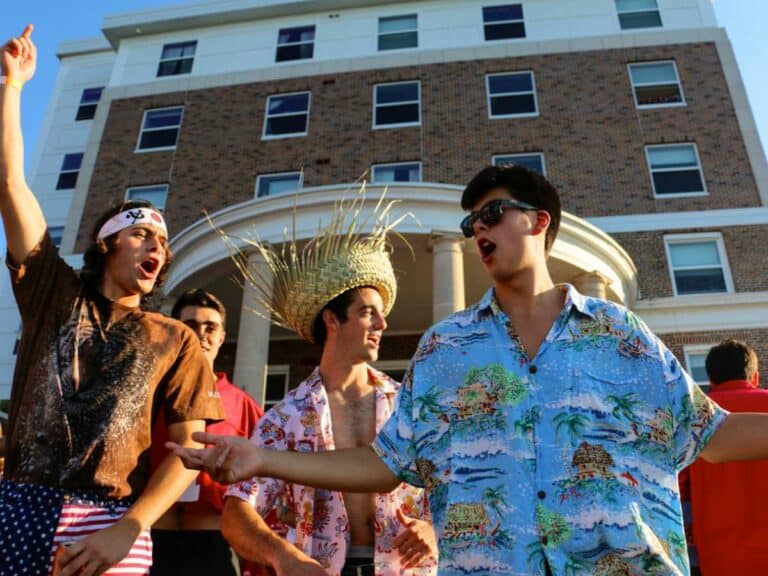The Good, the Bad, and the Ugly of Rushing: Are You Ready?
There are things you need to go through before being inducted into a fraternity or sorority.
No, it’s not hazing — 44 states have some sort of anti-hazing laws.
Rushing is an exciting campus experience, usually lasting for a week, where Greek-letter organizations hold various activities and events for prospective members to learn more about them.
Happenings range from info sessions to house tours.
Of course, there are typical frat and sorority goings-on, too, such as parties and philanthropic efforts.
There’s rushing, and then there’s dirty rushing.
A dirty rush is when one organization convinces potential members to join by giving them gifts, bad-mouthing other groups, and other activities the college or university prohibits.
Sometimes, it also involves hazing students who are practically begging to join.
Whether you have a particular group in mind or are yet to decide on one, participating in a rush can help you make the best choice and enjoy the most memorable and rewarding Greek life possible.

What Happens During Rushes
The rushing extravaganza can vary from one fraternity and sorority to the next.
Similarly, it can vary from college to college, depending on traditions.
However, many rushes hold similar events, each designed to allow students actively seeking membership into a brotherhood or sisterhood to find what they are looking for.
Let’s take a quick look at some programs you may encounter at your college during rushing traditions:
Information Sessions
Simply put, info sessions are open meetings scheduled by fraternity and sorority groups.
They aim to educate prospective members on the most important things they need to know about an association, such as its history, values, activities, and organizational officers.
Participating in an info session allows you to determine whether a particular society offers the best fit.
Likewise, attending several ones, though time-consuming, enables you to compare various groups with one another, thus letting you determine which of them is worth your time.
House Tours
Are you considering residing in a frat or sorority house than in an on-campus dorm?
Ensure that you don’t miss the house tour held by the Greek organization you are eyeing — it will allow you to practically experience what it’s like to reside there during your college career.
A tour lets you see the common areas inside and outside the chapter house.
Similarly, it enables you to see the members’ living arrangements to have an idea of what your Greek life would be like if you chose a membership to the group.
Meet and Greets
It’s not enough that you learn more about a fraternity or sorority through an info session.
It’s crucial, too, that you learn more about its active members through a meet-and-greet affair.
Meet and greets are beneficial for both current and prospective Greek system members.
The interaction enables students to see whether it’s the type of individuals they would like to be associated with and also allows members to persuade promising prospective members to join.

Open Parties
A rush week won’t be complete without fraternity and sorority parties.
Wet (with alcohol) or dry (without alcohol), a party provides a fun and hassle-free environment for students in the process of learning more about their potential Greek-letter home.
It’s like a meet-and-greet session, although with a more informal quality.
Consider attending even if you are not fond of parties to see whether the group’s revelries are rowdy or orderly.
Philanthropic Events
Most frats and sororities give back to the local community.
One of the ways they exercise their civic duty is by holding all kinds of philanthropic activities to raise the money necessary for creating and supporting community-based projects.
It’s not uncommon for events that support causes to happen during the rushing process.
Partaking in them allows you to experience what it’s like to impact lives positively.
The Downsides of Rushing
Even though there are perks to rushing, there are also not-so-good things about it.
Whether or not participating in it can do more harm than good will depend on how well you can manage your time, stay organized, know your limitations, and conduct research and observation.
Before you head to a rushing event, consider the following:
Time-Consuming
As mentioned, college rushes are usually week-long happenings.
First-year undergraduate students must budget their time carefully more than others on campus, given that they are still transitioning from their high school lives to their undergraduate careers.
Prioritize your studies over finding the perfect frat or sorority for you.

Negative Reputation
Many people, students and parents alike, frown upon Greek-letter groups.
No one can blame them for doing so since fraternities and sororities in the United States have a long history of alcohol abuse, drug use, sexual assault allegations, and hazing.
Keep your eyes peeled and leave if any rushing event makes you uncomfortable.
Membership Dues
Rushing activities are usually free of charge.
On the other hand, joining a fraternity or sorority isn’t in most instances.
Yahoo! Finance says that membership costs can be from $1,000 to $4,750 per semester on average — remember to keep that in mind as you hop from one rushing event to the next.
What to Do During Rushes
Rushing lets you learn more about available societies, especially the ones you like.
It also enables you to discover what collegiate Greek life is like, thus allowing you to realize whether fraternity or sorority membership should be a part of your college experience.
Attending a rush is a great way to meet new people, including future friends for life.
Ask Questions
Before heading to any rushing event, write down important questions to ask.
You must look into each organization’s recruitment process, membership fees, time commitments, social activities, leadership opportunities, academic support systems, etc.
Avoid feeling too shy asking important questions because it will help you make an informed decision.
Take Down Notes
Asking pressing questions isn’t enough.
It’s also a must that you write down crucial answers to your questions.
Especially if you are torn between multiple fraternity or sorority groups, having instant access to all the essential details is a must when making your final decision after getting bid after bid.
Dress the Part
Some rushing events come in various parts and successive stages, and they can range anywhere from casual to formal, depending on the frat or sorority involved.
Remember to inquire about details before attending each program.
Stick to the dress code and at the same time stay true to your fashion sense and personality.
Be Who You Are
Speaking of personality, show up at each rush being yourself.
It’s always a good idea to be genuine and authentic through and through — it will help officers and members determine whether you are a good fit for their organization.
Fret not if they don’t like your true self; you may be better off in another fraternity or sorority.
Read Also: Can You Drink In College Dorms?
Disclaimer: The views and opinions expressed in this article are those of the authors and do not necessarily represent those of the College Reality Check.





